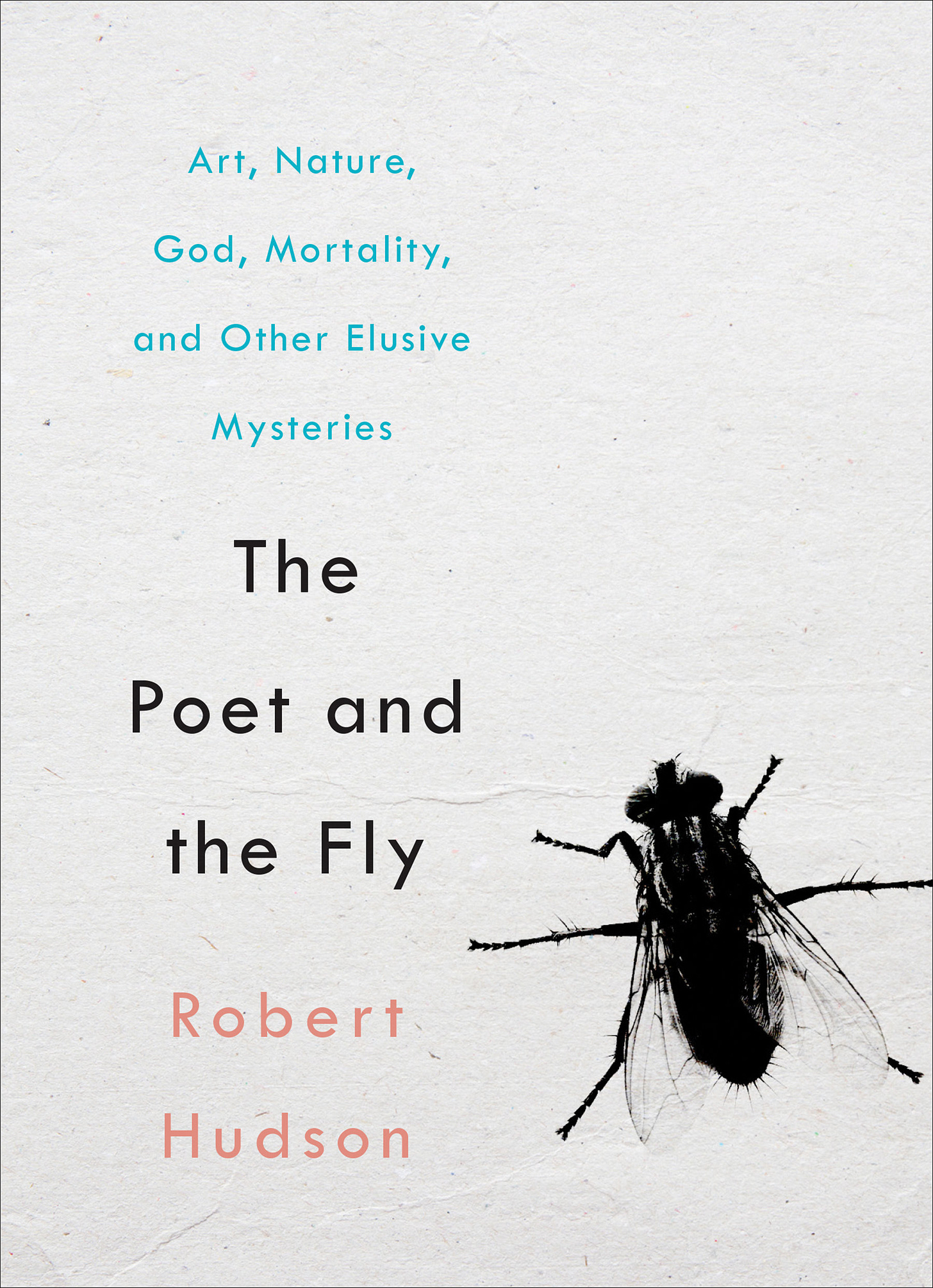This is our weekly free email. For the full FORMA experience, including the print edition and exclusive digital content, subscribe today. What you missed this week: The debut of “The Double Feature,” a column that shares two books worth pairing.

It is August. The stifling air is thick with flies, yet it has not occurred to me to connect the constant buzzing and swarming with poetry. In this—at least according to acclaimed poetry critic and author Robert Hudson—I am deficient, since Hudson’s newest title, The Poet and the Fly, posits that flies are such stuff as poetry is made of. The intriguing little book claims that “the fly provides a moment of revelation, a window, a shaft of sunlight” that can illuminate the shadowy mysteries of life.
To defend his curious thesis, Hudson examines worldwide writings about flies from ancient Israel to medieval Japan to twentieth-century Europe. Beginning with an explanation of the Hebrew word for fly (zebub, pronounced “zevuv,” evoking the fly’s buzzing) and continuing through a tender-hearted master of haiku, the writings of a long-lost metaphysical Anglican, and an arcane modernist poem about the fly-gobbling pets of a Celtic saint, Hudson expounds upon the illustrious literary legacy of flies. The Poet and the Fly is a slim, accessible volume consisting of a prologue, seven chapters, an epilogue, and an appendix. In each chapter, Hudson explores a single theme (compassion, mortality, imagination) taken from a poem featuring our hero: the fly. He makes a compelling case that the fly is indeed a powerful universal image for the fleeting darts of human mysteries.
Some chapters are almost obligatory. For instance, any credible treatise on fly poetics (if there is such a thing) must dedicate a chapter to Emily Dickinson’s “I heard a fly buzz - when I died.” Along with a series of incisive thoughts on the theme of “the soul,” Hudson also gets into the chilling mechanics of the thing, pointing out that “on a musical scale, a fly’s wings hum an F” and that “when we die, hearing is the last of the senses to shut down.” Eerie. Equally compelling are comments on the form of the poem. Dickinson wrote it in common meter—the typical metrical form found in hymns. “In fact,” Hudson avers, “you can sing the words of ‘I heard a fly buzz’ to the tune of ‘Amazing Grace,’” By way of research, I tried it; it works, and I expect I will forevermore shudder whilst alone in a room with a fly.
Other chapters introduce readers to obscure or unexpected sources, including the Anglican spiritual writer Thomas Traherne, whose The Kingdom of God was penned in the late seventeenth century but lost, only to be discovered and published for the first time in 1997. Hudson’s chapter on “existence” contemplates Traherne’s thought experiment inviting readers to consider whether creation would reflect sufficient glory upon the Creator if a single fly were the sum total of sentient life. Reflecting on the “neat and exquisite distinction of his joints” and “the vivacity of his quick and active power,” Traherne follows his argument to its inevitable conclusion—the fly would indeed be “a treasure wherein all wonders were shut up together.” By reducing all of creation to a single fly, Traherne redeems the reductio ad absurdum (“reduction to absurdity”) argument, which follows a flawed premise to its rational conclusion. “He flips this process on its head,” Hudson muses, “Traherne pursues a sort of reductio ad glorium Dei, ‘reduction to the glory of God.’ ” In Traherne’s eyes, a fly is no longer “an annoying, buzzing insect that hatches out of the dead, decaying things.” Rather, he “looks at the fly and sees the unmistakable glory of God.”
But there’s more. Hudson also writes with eloquent precision about “art, nature, God, mortality, and other elusive mysteries” in the many flies of Blake, Issa, Oldys, Apollinaire, and Farren. The contrast between the plethora of literary flies creates both dissonance and harmony throughout the book. Dickenson’s detached buzz is wholly different from Traherne’s distilled cosmos, but both, of course, are flies. Thus, readers must grapple not only with the varied portrayals of the fly throughout literary history, but also with the multitudinous interactions of language, symbol, and theme of which poetry is not only capable but is its glory. Thus the book becomes more than a well-read examination of flies, but a contemplation of the grandeur of poetry itself.
Heidi White is managing editor of the FORMA, host of the FORMA Podcast, and a regular contributor to the Close Reads Podcast Network. She lives and teaches in Colorado Springs, CO.



